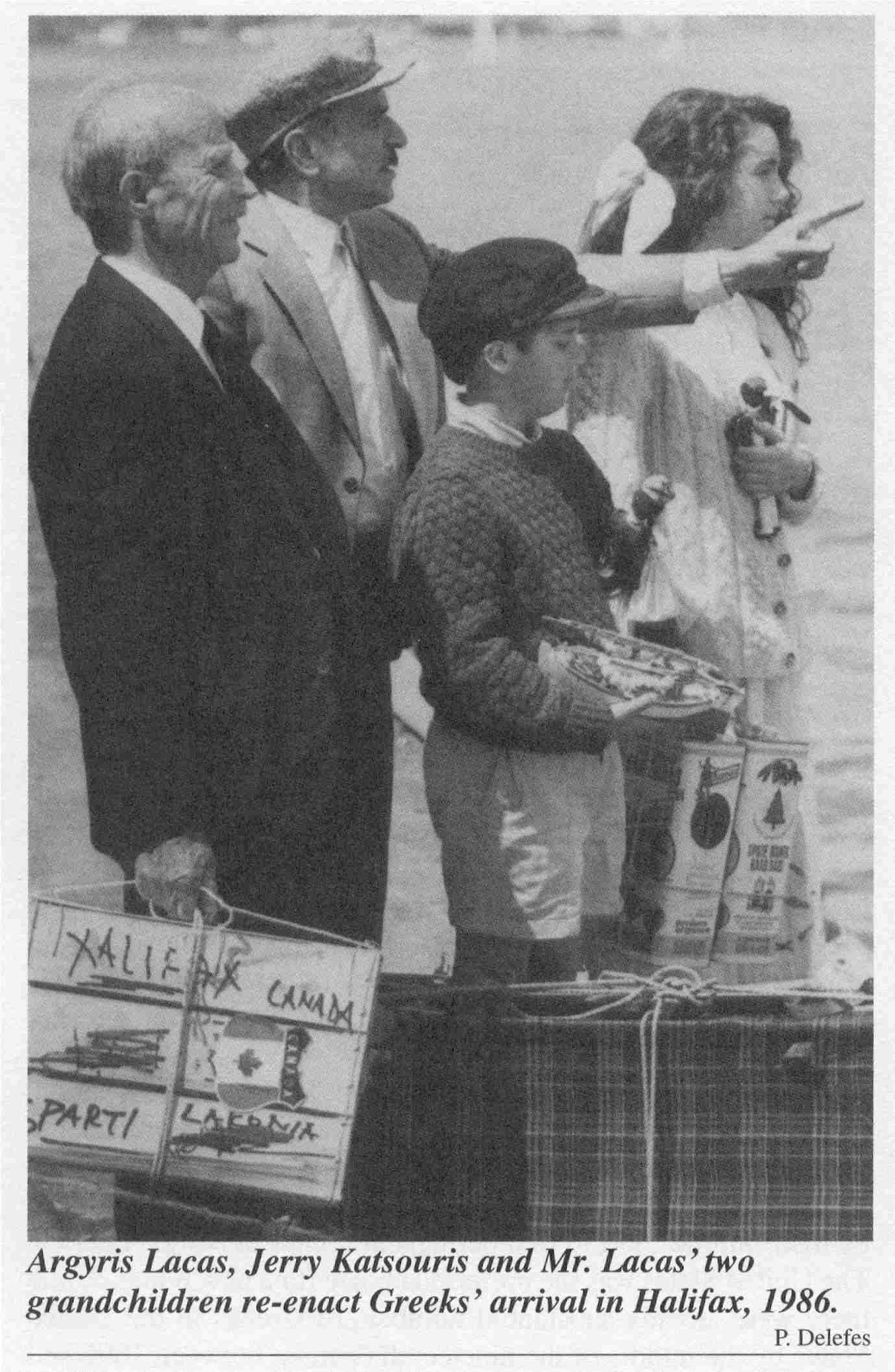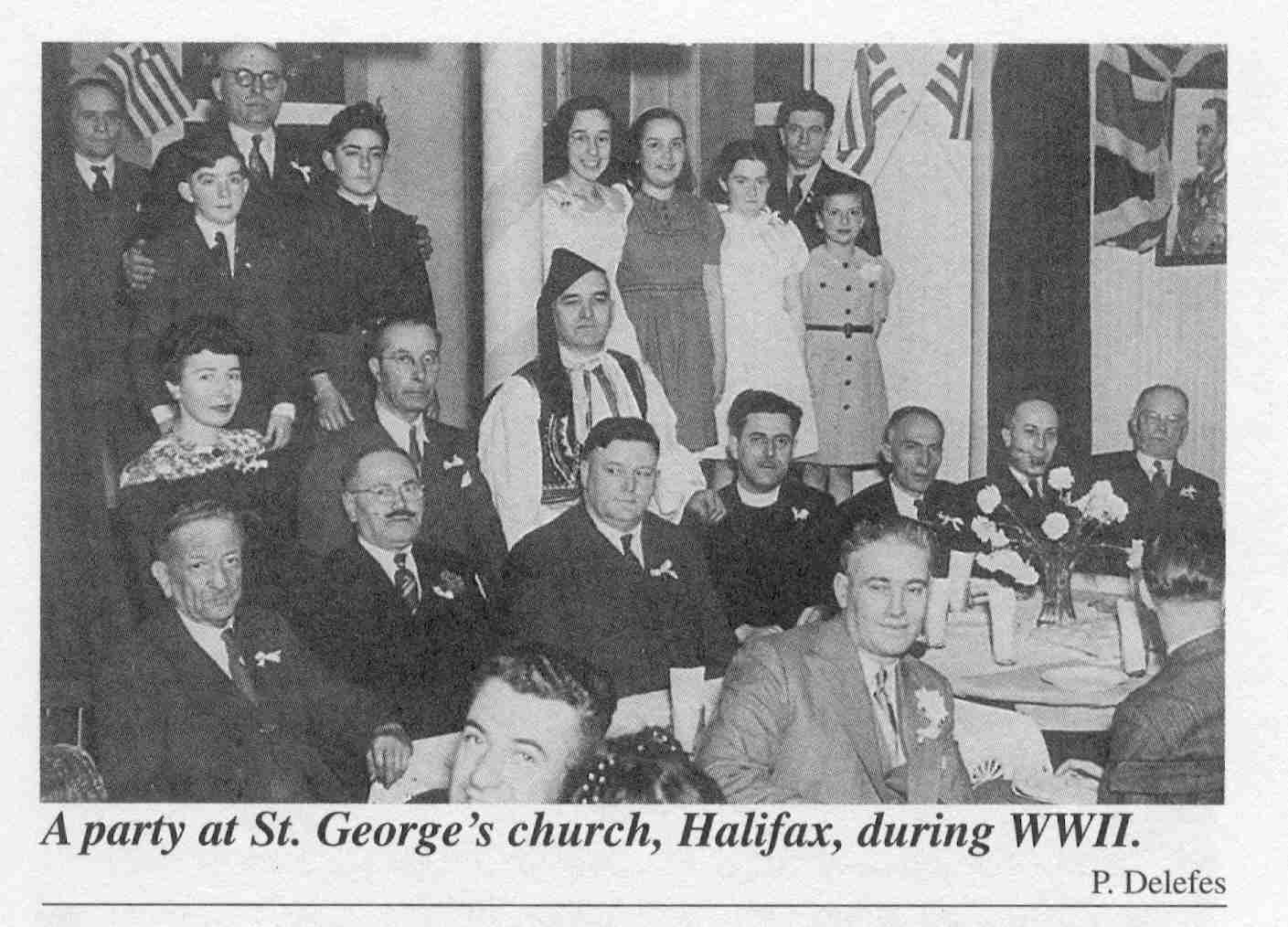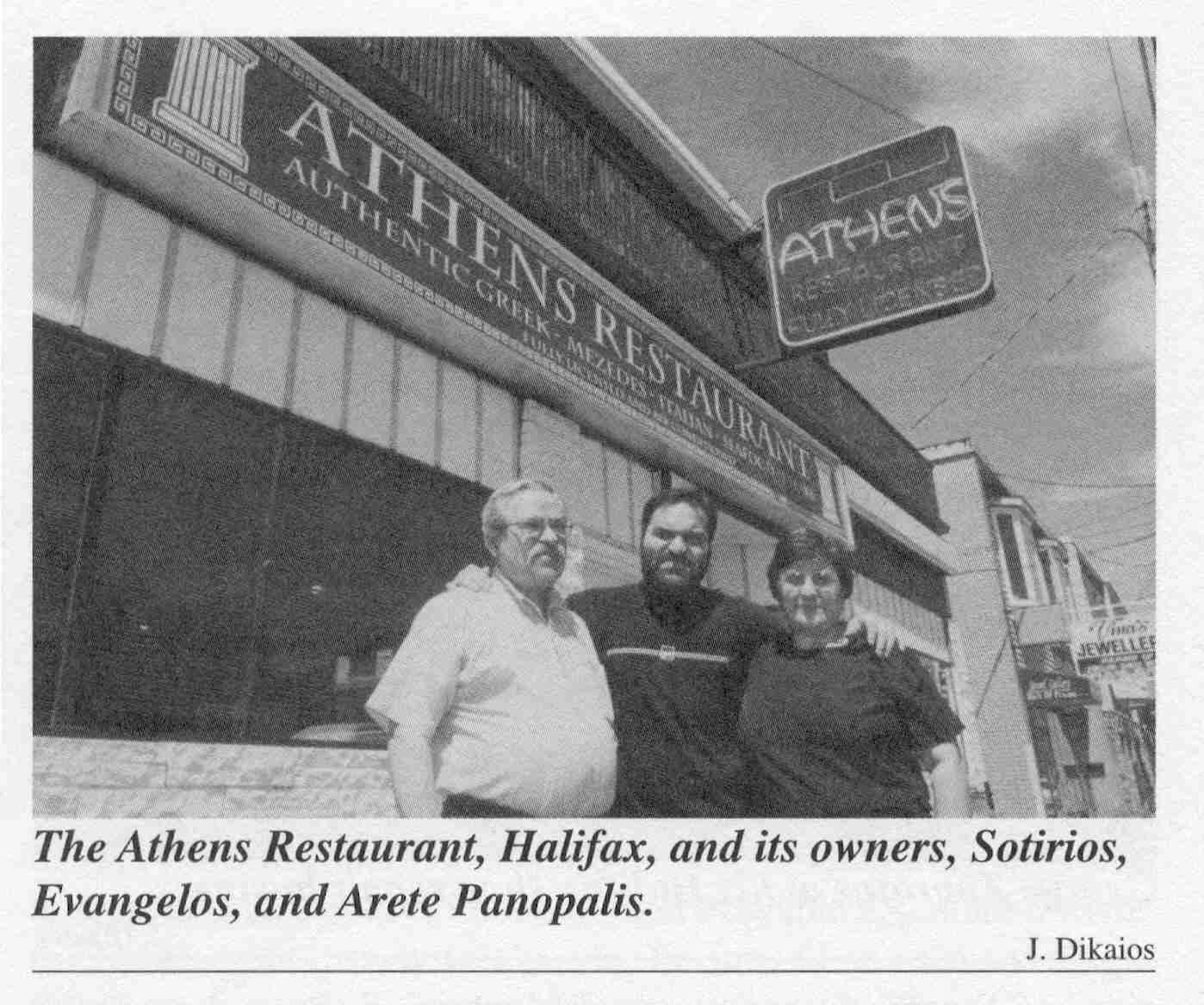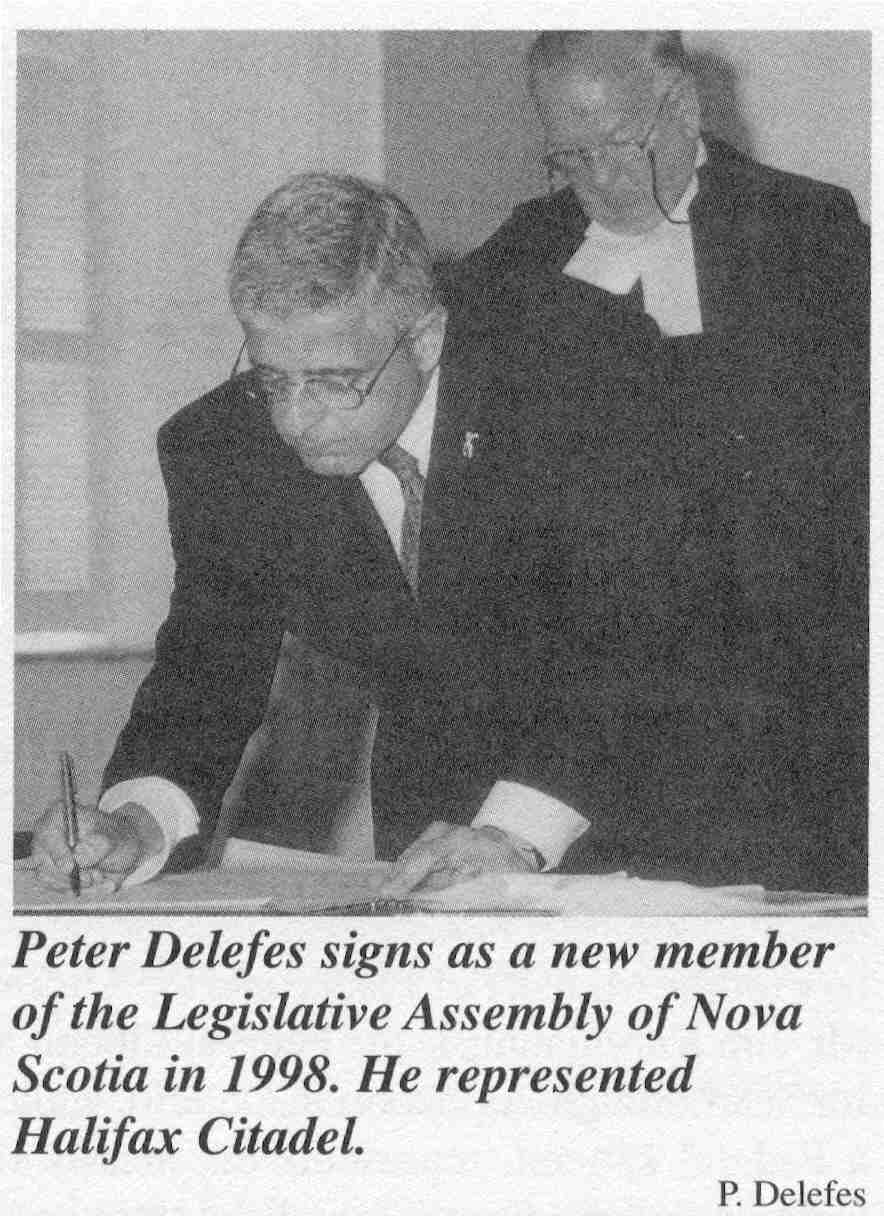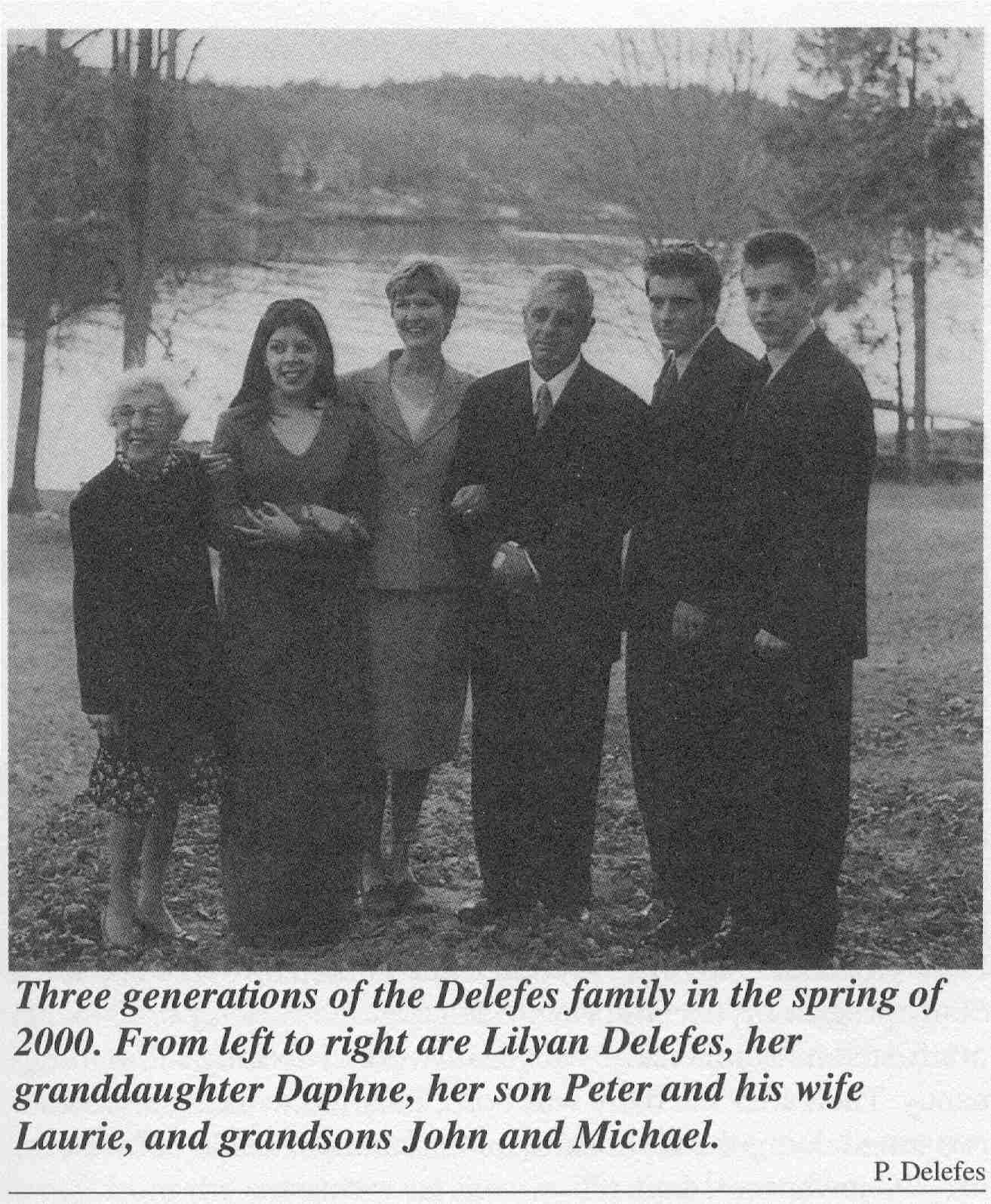II.3 History in the Maritimes
Nova Scotia became home for one of, if not the
earliest known Greek immigrant to reach Canada.
The 1861 Nova Scotia census lists a man called John Alexander Greek,
of Greek origin, living in Lunenburg County.
That 1861 census also shows him married with six children. According to the next census in 1871 two more
children arrived in the intervening years.
Direct descendants of John Alexander Greek continue to live in Lunenburg
County. Their family memories and records
insist that John Alexander Greek was, in reality, one John Alexander Lavanticis
or Levante or Levantakos. (There is no consensus on the spelling of his last
name.) Current members of the Greek
family told the author that their ancestor was born in Crete in 1777, arrived
in Canada in 1811, married a Rosanna Tanner of Nova Scotia on November 3rd
1814, and died on January 8th 1868. The old cemetery in Blue Rocks,
Lunenburg County used to contain his marked grave, but a fire in the cemetery
years ago destroyed all traces of it. According to one family story handed
down through the generations, John Alexander had been pressed into the British
navy in Europe, but was officially discharged in Halifax. Another branch of the Greek family insists that
he was shipwrecked off Blue Rocks, came to shore, and stayed in the area.
The author thinks that both stories could be correct.
It is possible that John Alexander did leave the British ship in Halifax,
and became a fisherman working on one of the boats from around the city. Perhaps it was that boat which came to grief
off Blue Rocks, leaving him to make a life for himself in Lunenburg County.
Family stories also say that their ancestor was known around Blue Rocks
as ‘Johnny the Greek’, and that he never learned to read and write English.
The author assumes that his problems with English and a name difficult
for a census taker to understand caused John Alexander Lavanticis/Levante/Levantakos
to be recorded as John Alexander Greek. The sixth and seventh generation
of John Alexander Greek’s line who live in Lunenburg County appreciate their
unique heritage with its connection to Greece, but they have long been a part
of mainstream Nova Scotian society.
Population statistics from the early 20th
century are imprecise, but they do suggest that in 1901 only a small number of people with Greek
ancestry were living in Nova Scotia.
Most of these would have been the descendants of John Alexander Greek.
The number of Greeks or people of Greek descent had increased to 114 by 1911,
inched up to 150 by 1921, and then doubled to 335 by 1941. In New Brunswick seven Greeks were listed for
1901, 54 for 1921, and 102 for 1941.
Prince Edward Island figures first showed Greeks in 1911 when 39 were
listed, but that number dropped to 10 in 1941. [Current population statistics
appear in Chapter II.1 “Greek People Come to Canada”.]
The
Greek Community in Halifax
Although their numbers were few, we know
the names of certain Greek men who were living in Halifax between 1900 and 1925. Evangelos Protopappas had come from the
island of Tenos, Andrew Zafiropoulos from Galaxidi, and Panayis Karamanos from
the island of Spetsai. All three were
sailors who had left their ships in the port of Halifax. In 1907 James Karas arrived from the village
of Katouna in mountainous Acarnania. (Mr. Karas’ daughter, Mrs. Lilyan Delefes,
recounts her story and her memories of the Halifax Greek community below.) Alex
Meletides arrived in 1908, and Aristides Meletides in the following year. In 1910 two brothers, Argyris and Nicholas
Petropolis, came to Halifax via Newfoundland from Arcadia, but Argyris soon
returned to Greece. While Nicholas Petropolis is best remembered for his
ownership of the Empire Theatre, in 1912 Peter, another Petropolis brother, arrived
and soon founded the well-known Cameo Restaurant. Gregory Poulos, who had
reached Halifax in 1914, joined his Petropolis in-laws in running The
Cameo. A few years later Argyris Lacas
became a family member and partner in that restaurant. As the 20th
century moved on, the owners of The Cameo sponsored numerous Greeks who came to
Halifax, worked in the restaurant, and from there went on to open successful
businesses of their own. The year 1912 saw the arrival of Thomas Castas from
Monasterion in Yugoslavia and Evangelos
(Angelo) Paros from Acarnania. The Alexander brothers who established
the Alexander Sweets Shop arrived in Halifax in 1920. Born in Constantinople, they had first gone
to Greece in 1912, but later crossed the Atlantic to settle in Syracuse, New
York. From there they came to Canada.
Members of that family are still very involved in the Halifax Greek
community. James Bastas from the island of Euboea arrived in 1916, and soon
established the J.B. Coffee Shop on Argyle Street. After his arrival in 1916
Nick G. Aliotis opened first a shoe repair shop, and later the Diana Cigar
Store on Barrington Street. Brothers George and Constantine Manolopoulos from
Arcadia were both in Halifax shortly after 1915. Later each served a distinguished term as
president of the Greek Council. Other
names from that early Greek community in Halifax include Theodore Sideris
(1915; from Triglia in Asia Minor), Emmanuel Symaeon (1913; from Rhodes), and
Joseph Tzagarakis (1914; from Crete).
It is rather interesting that among the
early immigrants only Nick Pappas, who reached Halifax in 1913, came from
Xerocampi, Laconia, in the southern Peloponnese. Today it seems that almost
half of the Halifax Greek community has its roots in that region of southern
Greece. Most Laconians came to Nova
Scotia considerably later than the “first families”; that is they arrived
during and after World War II and the subsequent Civil War in Greece.
During the terrible years of World War II
the small Halifax Greek community made an outstanding effort to help relieve
the suffering caused by war. In a letter
dated March 10, 1943,
Rev.
E. Athanasiou of St. George’s Church wrote to the Canadian Red Cross Society
saying that the entire church collection for that week was being given to the
Red Cross. A second letter signed by
thirteen men from the Greek community reads in part: “The business men whose
names appear below are all Canadian citizens of Greek descent…On the occasion
of the current appeal for funds by the Canadian Red Cross we are anxious to
assist in every possible way and to show our desire by contributing as
substantially as possible. We therefore
ask the Canadian Red Cross Society to accept the amount of total sales in our stores
on March 16th as our donation to its campaign. We propose to deduct
nothing. Our employees’ services will be donated and all other expenses will be
borne by us. The total of all money in our respective tills will be handed to
your representative.” The $2,000 this
collection raised was an enormous sum for the time. In a letter to the local newspaper, “The
Halifax Daily Star”, the President of the Nova Scotia Red Cross publicly
expressed appreciation for this wonderful gesture. His letter says, “These men
are citizens of whom fellow Canadians may feel the deepest pride. Their response to national appeals has been
consistently generous and wholehearted.”
In addition to support for the Red Cross
and its worldwide work, the Halifax Greek community collected money and
thousands of pounds of used clothing for the Greek War Relief Fund. In a letter
dated April 26,1943 addressed to Mr. Gus Manolopoulos the Hon. G. Depasta of
the Royal Greek Legation in Ottawa said: “I have
learned with national pride of the splendid work done by the Committee under
your leadership in the campaign for the Canadian Red Cross as well as your
contribution to the Greek War Relief Fund.
The above acts are praiseworthy and touch every Greek heart, for which
in my capacity of Greek Minister in this country, I wish to express to you and
through you to the members of your Committee and all who contributed in this
great humanitarian work, the heartfelt thanks of the Greek Government to which
I add my own. Greece is really proud of
all of you.”
The following section presents a number of
interviews conducted with some senior members of the Halifax Greek community
and/or their families. In their own
words they speak about their lives and the early years of their community.
When
100 year-old Argyris Lacas died on December 10, 1997, a remarkable life ended.
He had become papou or grandfather not only to his own, beloved family
but also to a whole generation of Halifax Greeks. Born in 1896 on the Greek
Island of Icaria, which was still under Turkish rule at the time, Mr. Lacas
left home at fourteen to join his older brother in Alexandria, Egypt. There he trained as one of the first
electricians who helped light the streets of Alexandria. Although he was successful in Alexandria, Mr.
Lacas wanted to be close to his family, most of whom had immigrated to the
United States. Arriving in 1918 at New York's Ellis Island, he had to remain
there for six months because quotas for Greek immigrants were full. He moved to
Montreal for two years before returning to live in New York and Philadelphia
for the next twenty years, where he and his brothers built a successful coffee
company. At present that business is run
by the third generation of the family. After coming to Halifax, Mr. Lacas
married a local Greek Canadian woman, Dina Petropolis, whom he had met when she
was visiting her relatives in New York.
Her family had opened The Cameo Restaurant, and Mr. Lacas soon joined
the business as a partner. Later he sold
his shares in The Cameo back to the other family members, while he opened his
own Doric Restaurant. Upon retiring from
the restaurant business, Mr. Lacas went on to represent Hayes Insurance in
Halifax, where he often helped local Greeks with their insurance claims. From 1959 to 1965 he owned a jewelry business
on Spring Garden Road. That particular business helped newly arrived Greek
jewelers to get started in the Maritimes.
Thus, although Mr. Lacas became a successful businessman in a number of
fields, material values never overshadowed his generous nature.
During the years from 1930 to 1950 the
Greek community of Nova Scotia was very small, but very close-knit. Mr. Lacas’
memories of those years included frequent barbecues at different homes, with
lamb as the favorite dish. Sometimes American Greeks traveled to Halifax to
visit relatives there. During the
summers several Greek families in Halifax rented cottages so that the women and
children could enjoy the countryside and the men could join them on the
weekends.
Mr.Lacas was the oldest member of AHEPA
(American Hellenic Educational Progressive Association) in North America and
was a co-founder of the organization in Halifax. He loved children. Martha Zografos, current president of the
Halifax Ladies’ Philoptochos, remembers that when she was a child, on Sunday
afternoons she loved going with her family to meet other local Greek people in
the Halifax Gardens or at the Halifax Citadel.
At those gatherings it was always Mr. Lacas who pulled quarters out of
his pockets for all the children to go and buy ice cream. Since Argryris Lacas
so enthusiastically promoted the education of the young, after his death the
Halifax AHEPA established a regular $1,000 scholarship in his memory. This is
given each year to outstanding Greek Canadian students who are entering
university. In the 1950s and 1960s Argyris Lacas was a constant presence at
Pier 21 in Halifax, where he met, befriended, and translated for many of the
Greek immigrants to Canada. His son-in-law, Takis Kostopoulos remembers this
particular incident: “ One day I went
with my father-in-law to Pier 21, because we knew Greek immigrants were
arriving there. When we finished with
the immigration process for one family, the man tried to give my father-in-law
two dollars to show his gratitude. Of course, papou would not take the money
and said to the man, ‘You keep the money. You need it more than I do.’”
Argyris Lacas was a founding member of St.
George's Greek Orthodox Church in Halifax, a longtime member of the Church
Council, and president of the Council on several occasions. His son-in-law
describes him as a kind, generous, and honourable man who always loved people,
and was there to help when they had any kind of trouble. Mr. Kostopoulos said
of him, “My mother-in-law never knew how many people were coming for Sunday
dinner, because her husband would always bring someone home with him.” His son,
Fokion, remembered how his father was constantly loaning books- particularly
the family’s encyclopedias to anyone who wanted information. The encyclopedia
volumes rarely returned, but Mr. Lacas just kept buying more. Some of Argyris Lacas' immediate family
continue to live in Halifax and are active, involved members of the Greek community. They include Mr. Lacas' son, Fokion Peter,
Fokion’s wife and children, and Mr. Lacas’ daughter, Nina Kostopoulos, her
husband and children.
Mrs. G.N. (Lilyan) Delefes is a
second-generation Greek Canadian who was born in Halifax. Her father was one of
the first Greeks to come to Nova Scotia, and Mrs. Delefes herself is now one of
the senior members of the Halifax Greek community. Here is her story:
"My father, James Karas, was a
shepherd from Acarnania who came to Halifax shortly after 1900. Before coming
to Halifax he had worked on the building of the new Panama Canal. When he
reached Halifax he worked in a store with another Greek, John Pearl. When my father expressed the wish to get
married, his partner suggested his sister as a good match. So they sent her a photograph which she
apparently tore up in pieces. She was,
however, gradually coaxed into coming here to marry my father. They got married in 1911. My mother, who was born in Naxos, had lived
in Constantinople or “the Polis” for a number of years, and she was at first
bitterly disappointed in Halifax. She
found it too remote and quiet compared to a big city like Constantinople. She was a wonderful seamstress and could do
beautiful embroidery. All I managed to
do was to get her sewing machine all muddled up and exhaust her patience. Another regret I have is not sharing her keen
interest in cooking. She brought
wonderful recipes from Constantinople.
However, I view cooking more as a necessity than an art.
In Halifax my parents had two children,
my brother and me. Unfortunately they
both had to work very hard, and my father had the Scotia Meat Market, so they
did not have much time for us as children.
It seemed that my early childhood fled by so fast, and I remember most
fondly my leisurely visits to aunts in New Brunswick who had no children of
their own and loved to have us. I am
sure that my mother had a lot more to offer us, if she had had the time to sit
down and think.
When I reached school age, I was sent to
the Convent of the Sacred Heart in Halifax.
At that time it was a boarding school.
Admittedly, it gave me a good education, but as a result of not being home,
my Greek was suffering, and, of course, I have never learned to read or write
Greek to this day. Also, being so close
to other Canadian girls who were allowed to have boyfriends, when I was not,
made it rather difficult for me. Another
way in which I felt I was different was the fact that I belonged to a small
minority in Halifax. There were only
about twenty-five Greek families here.
As I was growing up, I remember that we
had a lot of dances and social functions among the Greek people. We never had a church until the 1930s, but we
had a hall, and that was where we used to congregate. The men used the hall like a kafenion every
evening. They would go there, leaving
their wives to take care of the children and the store, and they would drink their
coffee, talk to their friends, play cards, and spend a pleasant hour or two. A priest would come to Halifax, if there were
a wedding, christening, or a funeral. I
remember having lots of fun at christenings or wedding parties. During one of
the Greek dances I saw this very tall, handsome, Greek officer who was in the
Greek Merchant Navy. I was introduced to
him, and I noticed that he wore a black tie, and that he was not in the mood to
dance. When we talked, I found out that
a landmine had just killed his younger brother. He also told me about his
parents who used to live in Smyrna in Asia Minor where his father had a tobacco
business. They were very well off, but
disaster struck them. Leaving their
father behind, the rest of the family was forced by the Turks to abandon Smyrna
and go to Athens. His mother died shortly after they reached Greece. His father
came to join them later in Athens, where he was shocked to find them in a
refugee camp.
Anyway, I eventually married the
handsome, Greek sailor and we had about a year and a half together. As World War II went on, my husband had to
leave our eight-month-old son, Peter, and me.
He never returned. In February
1944 his ship, the ‘Aikaterini’, sank in the Bay of Fundy with the loss of the
whole crew of twenty-six seamen. I went back to live with my parents. My parents were good to me, but I started to
think that I could not depend on them forever.
So when my son went to school, I decided to train as an x-ray
technician. This enabled me to get a job
and become more independent. I looked
after my parents as long as they were alive, and when they died I was able to
give my son a good life. I never married
again, but I have no regrets."
Mrs. Maria Georgakakos talked about her early
years and first impressions of Canadian life:
"I came to Canada in 1958, because
my fiancé had come here for better job opportunities after the end of World War
II and the Civil War in Greece. After a
nine-month delay I reached Canada with my fiancé's younger sister. On December
9, 1958 we came through Pier 21 to find the Greek priest and my fiancé waiting
to welcome us. My first impression of
Halifax was very positive. I liked the
small houses, and it was the first time that I had seen snow. It was also the first time that I had seen so
many decorations for Christmas. The week after I arrived, we went to City Hall
and we signed our marriage license. We
got married on December 25th, Christmas Day, because that was the only day that
my fiancé had off work. After we were
married, I remember that I would wait for my husband to come home for lunch at
noon as we did in Greece. However, my husband told me that this was not the way
things worked here, and he would come home later in the day for supper.
Eventually I got used to it.
On December 29th, right after
our wedding, I went to work for a Greek restaurant where I was responsible for
the cash register, because it was the only position that did not need language
skills. At this point I didn't know any English. I worked during the night and my husband worked
during the day. Once, my boss told me to
wash the windows inside and out, but because of the snow and the cold air, I
could not get them clean. I was almost crying with worry. I worked for some time at the restaurant, but
because I did not know the language, I could not keep up with the work. Then I went to work for Koolex Kleaners. I started to learn a little bit of English
with the help of my Greek and Canadian friends.
Meanwhile, I was pregnant with my first child and I worked up to the
last week of my pregnancy, because we needed the money. They used to call my first son “Koolexaki”,
because I worked so long in my pregnancy. Then after the baby was born, I
started working at another restaurant doing the night shift, and my family
would baby-sit for me. We never took
days off or went on vacations.
This hard life made us homesick, but we
could not leave and go back to Greece, because we did not have enough money,
and we were determined to make it work.
My husband would tell me to have patience, so we could learn the
language and save up enough money to buy our own business. To do that we hardly spent any money. We were
seven people in a two-bedroom flat with a kitchen and a common bathroom. But we supported each other as a family. Then my husband and I had our second child, a
baby girl. We baptized both the children
together, because we did not have enough money to spend for two separate
celebrations. We worked harder still and
in February 1961, we bought our own snack bar. We had gone to the bank, and
taken out all our savings, and the bank gave us a loan. All the family worked together in the snack
bar. Then we started to bring other
members of our families to Canada, because here in Canada we had better job
opportunities.
Through
the Immigration Department we gradually brought eighty family members to
Canada.
We all continued to work so hard, and when
we saved enough money from the snack bar we bought our first home. We always helped our relatives who came to
Canada to buy homes and businesses.
After we had our third child, a boy, we wanted our children to know more
about their Greek heritage and language. That was when we brought our mothers
over, and started to go back to Greece to see the relatives there.
I always had the support of my family and
friends. We have Canadian as well as Greek friends. We have helped some of our waitresses at Gus'
Pub and Grill save enough to get homes of their own and our former snack bar
had now been upgraded to a restaurant.
Although my husband already has his pension and I get it later this
year, we still like working in our restaurant because that way we get to meet
all our friends. The hours of work do
remain long, and eight to fourteen hour days are still the norm. Today our youngest son is involved with us in
the business, and he will probably carry on with that for the foreseeable
future. Looking back now, I am pleased that I came to Canada after those bad
times in Greece. But I still have a problem with the English language and I
don't understand it as well as I do Greek."
Callie and Takis Iatrou were, and are, two of
the most involved members of the Halifax Greek community. Mr. Takis Iatrou is a past president of the
Greek Church Council, and his wife, Callie,
has been the principal of the Greek School and director of the church
choir for many years..
As a second-generation Greek Canadian,
Callie Iatrou was born and raised in Halifax.
Her father, George Alexander, was one of the first Greeks to immigrate
to Nova Scotia in the early part of the 20th century. He had
returned to Greece where he married Fanoula Melas from Athens. About 1932 Mr. and Mrs. Alexander came back
to Halifax, where they settled permanently. For years Fanoula Alexander was one
of the most active ladies in the Halifax Greek community. Talking about growing
up in Halifax in the 1940s, Callie Iatrou said, “My parents were very
strict. I remember that when I wanted to
go to the prom at Queen Elizabeth High which I was attending, my parents
wouldn’t let me attend until one of my male cousins agreed to take me. When the other girls talked about their
boyfriends, we Greek girls felt uncomfortable, because our parents would not
let us date. We also felt uncomfortable
talking about our Greek background back then because people were often not very
open in dealing with different nationalities.” Callie Iatrou did enjoy growing
up in Halifax’s small Greek community. “We used to get together at the Greek
Church on Morris Street once a week to play Ping-Pong and bridge. The choir
practiced every week, and since I was only ten, I was the youngest member of
the choir. We always had large
gatherings for our national Greek holidays where we performed the plays and
dances of Greece.” After high school Mrs. Iatrou went to Saint Basil’s Greek
American Teachers College in Garrison, New York in order to become a teacher.
She said, “It was among the best years of my life.”
Mr. Takis Iatrou came to Canada in the
early 1950s from the city of Megalopolis in the Peloponnese because of the wars
and political crisis in Greece. Going
first to Montreal, he worked in a Greek restaurant there for two years. “It was the only job that I could do which
required few language skills, since I knew no English or French. Another reason was the fact that I had to
repay my ticket to the person who had paid for me to come to Canada. After a couple of years a friend of mine was
opening a new business here in Halifax, so he asked me if I would come to Halifax
and help with that.” After arriving in Halifax, Mr. Iatrou soon met his future
wife, Callie, and the couple were married in 1956. The Iatrous told us that the Halifax Greek
community at the time was so small that all twenty-seven Greek families living
in the city were invited to their wedding.
Mr. Iatrou went on to say that even
after some years of working in the family restaurant in Halifax, language was
still a problem for him. “I went to the YMCA once a week to learn English. Our good customers and my wife also helped me
with the language. Then our children were born and things became easier. Since both my wife and I worked, the children
stayed with their grandparents. For long
periods they also went to Greece to stay with their grandmother there. We wanted them to learn the culture and
language of Greece. Sometimes that made
trouble for them with English, but when they went back to school here they
picked it up very easily.”
In 1963 Mr. Iatrou became president of
the Greek community. After his term as
president he remained on the church council for several years. Because the
community was growing, their main focus was to improve the facilities of the
Greek School which enrolled about forty to fifty students. In the 1970s the Greek
school grew to around 160 students. Callie Iatrou told us that in the 1960s and
70s it seemed that the Greek community was becoming more accepted by the
non-Greek population. She attributes
this in part to the more prominent face which the Greeks presented to the
wider, non-Greek population by events such as the sponsorship of a Greek Day at
Saint Patrick’s High School. Public officials at the civic and provincial
levels also showed their willingness to assist the Greek community with
resources for the Greek School and financial help with the new community
centre.
